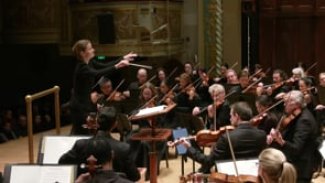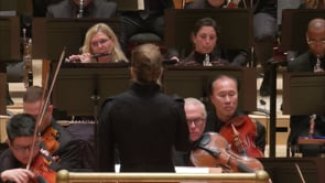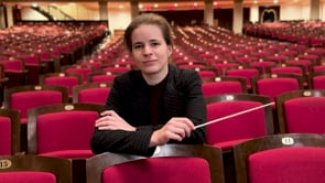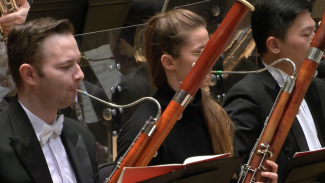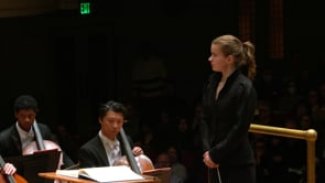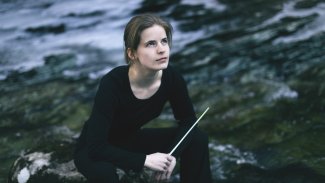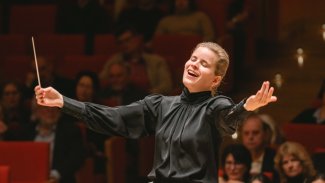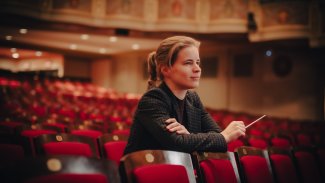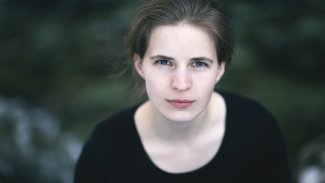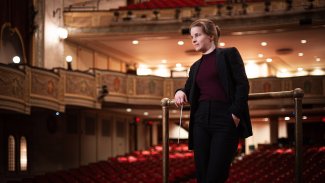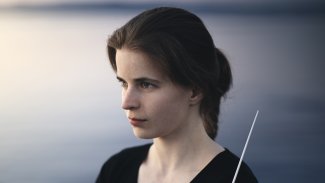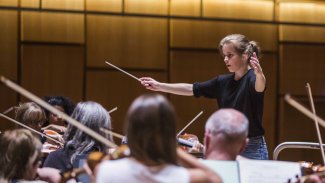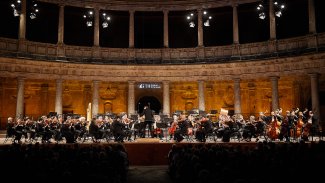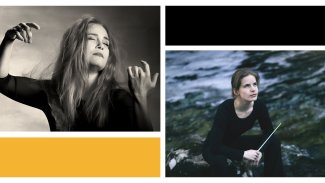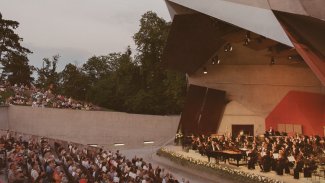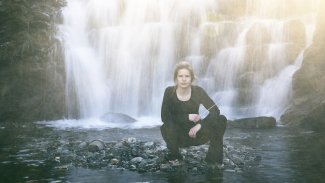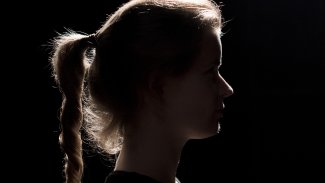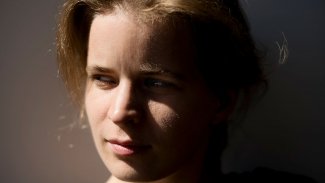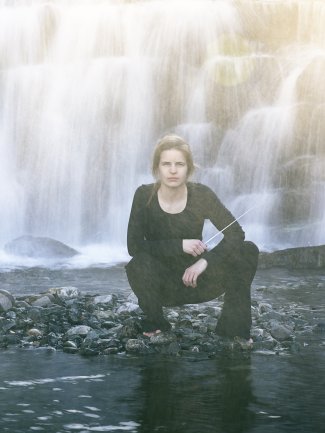
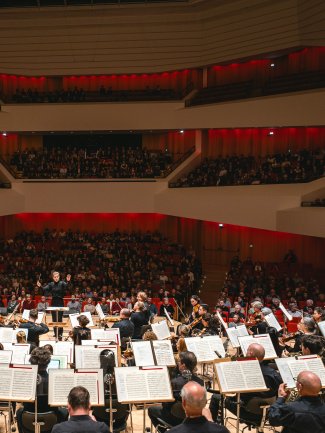
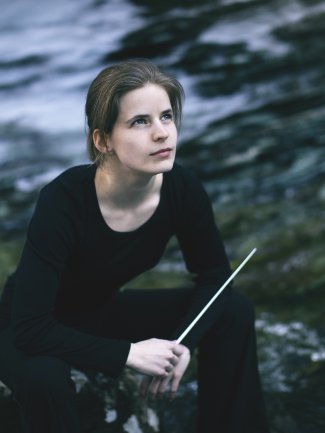

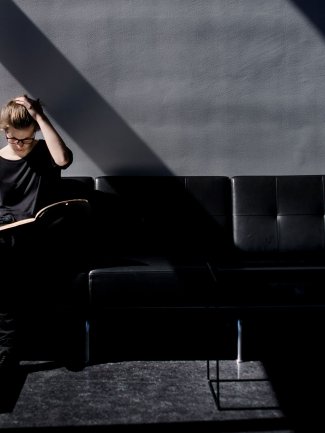
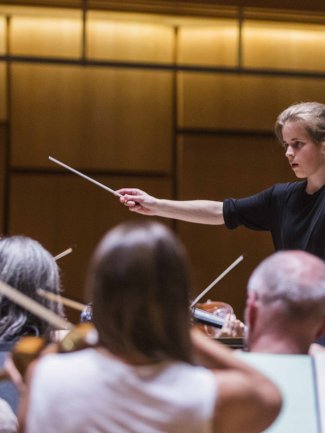
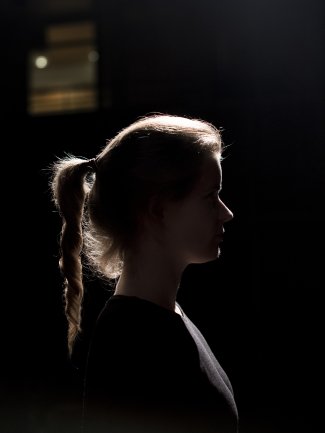
Tabita Berglund
“There was nothing ordinary about these riveting performances […] under the charismatic direction of young Norwegian conductor Tabita Berglund. […] Rarely have I heard such a responsive and alert-sounding orchestra, playing these works as if they were first performances”
(Bachtrack, May 2024)
Principal Guest Conductor: Detroit Symphony Orchestra
Principal Guest Conductor: Dresdner Philharmonie
Tabita Berglund has established herself as one of the most in-demand conductors of her generation. With a charismatic style that combines elegance, verve and precision – eliciting “exceptional music-making” (The Arts Desk) – she collaborates with leading orchestras worldwide. Berglund is Principal Guest Conductor of both Detroit Symphony Orchestra and Dresdner Philharmonie, having been appointed to each position following her respective debut.
Berglund commences 2025/26 with Dresdner Philharmonie’s season-opening concerts – her inaugural engagement as the orchestra’s new Principal Guest – and returns in May 2026 to open the Dresden Music Festival. Notable debut appearances across the season include Deutsches Symphonie-Orchester Berlin, Staatskapelle Berlin, Cincinnati Symphony Orchestra, St. Louis Symphony, hr-Sinfonieorchester Frankfurt, NDR Elbphilharmonie Orchester, Sydney and Melbourne symphony orchestras, while returns include Dallas Symphony Orchestra, Gothenburg Symphony, Bergen Philharmonic Orchestra, Lahti Symphony Orchestra, Düsseldorfer Symphoniker, Tonkünstler-Orchester Niederösterreich and Trondheim Symphony Orchestra. Among the highlights of Berglund’s second season in Detroit is a specially curated two-week Northern Lights Festival.
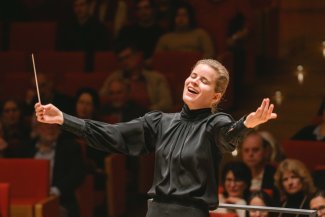
Show More
Berglund regularly collaborates with leading international soloists; recent and forthcoming partnerships include Jean-Yves Thibaudet, Hélène Grimaud, Pekka Kuusisto, Leila Josefowicz, Augustin Hadelich, Truls Mørk, Kirill Gerstein, Nicolas Altstaedt, Håkan Hardenberger, Alexander Malofeev and Camilla Tilling, to name a few. Her 25/26 programming reflects her breadth of repertoire interests, from Mozart and Schubert to Tchaikovsky, Scriabin, Mahler, Schoenberg, Bartók and Lutosławski, among others, and continues her championing of Nordic compatriots such as Thorvaldsdottir, Sibelius and Irgens-Jensen.
Recent engagements include Los Angeles Philharmonic, Minnesota Orchestra, Houston Symphony, Tokyo Metropolitan Symphony Orchestra, Bamberger Symphoniker, Gürzenich-Orchester Köln, Royal Stockholm Philharmonic Orchestra, Philharmonia Orchestra, Orchestre de chambre de Paris, Polish National Radio Symphony Orchestra and Iceland Symphony Orchestra, among others. Among Berglund’s past festival appearances are Festival Internacional de Música y Danza de Granada and Grafenegg, while recent opera and ballet productions include Mozart’s Le nozze di Figaro (Garsington Opera, 2024) and Tchaikovsky’s The Nutcracker (Norwegian National Opera and Ballet, 2024). In Summer 2024 Berglund chaired the jury for the grand finale of the Eurovision Young Musicians competition, broadcast live on television throughout Europe via the major networks.
Berglund studied at the Norwegian Academy of Music, first as a cellist with Truls Mørk and later orchestral conducting with Ole Kristian Ruud. She played regularly with the Oslo and Bergen Philharmonic orchestras as well as the Trondheim Soloists before conducting became her main focus. Her first titled position was as Principal Guest Conductor of Kristiansand Symphony Orchestra (2021 – 2024). Her debut CD, with Oslo Philharmonic and violinist Sonoko Miriam Welde, was released in 2021 (LAWO) and nominated for a Norwegian Grammy (Spellemann) in the 2022 Classical Music category.
Contacts
Jasper Parrott Executive Chairman HP Group & Associated Companies
worldwide general management
worldwide general management
“It’s easy to see why [Berglund] is turning heads. She possesses a fluid, clear technique and impressive musicality on the podium. Her leadership in Mahler was revelatory. She barely looked at her score, and her communication with the musicians was riveting to watch. In moments when the music smiled, the musicians smiled, too.”
“Without any histrionics, her expressive but disciplined manner on the podium consistently conveyed meaningful gestures to generate inspirational performances. Rarely have I heard such a responsive and alert-sounding orchestra, playing these works as if they were first performances. Without doubt, Berglund is someone to watch.”
“Berglund negotiated the transition into the Finale neatly, and thereafter perfectly judged its accumulating drama to create a magnificent life affirming traversal. There have been countless performances of this symphony by the Philharmonia over the years, but this emotionally charged account was one of the most vivid I’ve heard in a long time.”
“Tabita Berglund […] seems certain to become one of the most significant conductors from her generation. […] The acute characterization that [she] brought to each episode, then the emotional frisson when those main motifs come together for a powerful apotheosis, compelled admiration – as did the closing pages in which Sibelius cannily fragments form and texture so all that remains is an all-enveloping silence.”
“Tabita Berglund’s conducting style – alert, encouraging and inspiring – seems to bring out exceptional music-making.”
“(Berglund) is considered one of the most talented conductors of her generation and after this concert it is not difficult to understand why. She has an equally emotional and analytical relationship with the material and the communication with the musicians seems frictionless.”
“… at the helm here was the young Norwegian conductor Tabita Berglund, whose unfussy interpretation held poise and vigour. This is her second appearance with the Hallé, and her smiling warmth matched the Idyll’s radiance perfectly. The boundless energy that underpins her approach was best suited to the Beethoven that closed the concert. […] There was room for a rich Allegretto, too, in as athletic a Seventh as you’ll hear, leaving an appreciative if reduced Manchester audience invigorated.”
“(Berglund is) very capable of taking an orchestra with her in her ideas of how music should sound: she smiles encouragingly at the players a lot and makes constant eye contact […] She exudes confidence, and so does her music-making.”
“We take advantage of the somewhat disconcerting habit of giving hurricanes personal names to sum up the experience of what it means to see Tabita Berglund direct. Only, in this case, the metaphor alludes only to her overwhelming momentum and energy, without any of the negative connotations […] The result [in Beethoven’s Seventh Symphony] was forceful and jovial, brilliant but without being strident or tiresome […] The orchestra let itself be carried away and excelled at an extraordinary level of virtuosity and good sound. If the reports of the time detail that at its premiere the symphony was applauded to ecstasy, here the audience was able to renew their amazement and enthusiastic ovation.”
“Berglund led the four dozen or so [Royal Scottish National Orchestra] musicians with confidence, masterful direction, and expressions of pleasure and encouragement. Conducting with a baton, she has a very vigorous style, moving her arms energetically in conspicuous arcs. This works well in electrifying the orchestra as she transforms individual passages into a cohesive musical unity. In the physically smaller orchestra, the woodwinds and brass could have easily over-shadowed the strings, but Berglund never let the balance tip too far in their favour.”
“[But] Tabita Berglund managed to give this relatively heavy work new life! Powerful string sound, beautiful woodwind solos, shiny brass instruments […] Certain passages were actually reminiscent of film music, and the experience was completely different compared to hearing the work through the speakers at home – a feat of the young conductor!”
